Executive
Schedule F and the Deep State
Donald Trump’s biggest second-term secret is out: Schedule F, a way to make policymakers and intel agents accountable once again.
Washington has been buzzing for several days over an executive order that escaped popular notice when Trump issued it. That order created a new class of federal employees – Schedule F – that would not be “civil service.” Instead, Schedule F employees would be at-will employees, whom a President could fire at will. New reports now reveal that President Trump will reinstate Schedule F if he runs for and wins a second term. Which Trump will announce, one way or another, in two days.
Details of Schedule F
The Schedule F Executive Order exists today only on a National Archives host called “TrumpWhiteHouse.” It relies on Title 5, United States Code, Sections 3301, 3302, and 7511.
Section 3 of this order holds the key principle:
Excepted Service. Appointments of individuals to positions of a confidential, policy-determining, policy-making, or policy-advocating character that are not normally subject to change as a result of a Presidential transition shall be made under Schedule F of the excepted service, as established by section 4 of this order.
Section 4 defines the employment schedules:
- A – non-confidential and non-policy staff not subject to written exams.
- B – non-confidential and non-policy staff subject to non-competitive written exams only.
- C – confidential or policy-making staff normally asked to leave with a new President.
- D – non-confidential and non-policy staff subject to relaxed competitive service rules. The reason: strict rules would prevent recruitment of enough staff to fill these jobs.
- E – Administrative Law Judges.
- F – confidential or policy-making staff not normally asked to leave with a new President.
The order further directs all agency heads to review all positions, especially in Schedules A, B, and D – the non-confidential and non-policy staff positions. The idea is to identify which jobs really are “of a confidential, policy-determining, policy-making, or policy-advocating character.” Schedule F would receive all such functionaries that a new President does not normally replace at transition.
Who would go into Schedule F?
Schedule F staff would include:
- Writers of policies, rules, regulations, and guidance,
- All staff who do “substantive policy-related work,”
- Any supervisors of attorneys,
- Anyone having “substantial discretion” to determine how an agency does its job,
- People who handle privileged policy, regulatory, or other documents and report to a GS-13 or higher-paid supervisor, or are part of the “executive secretariat (or equivalent)” of an agency, and
- Anyone who negotiates union contracts.
That President Trump felt the need to write such an order, clearly shows that many federal employees had duties of confidential and/or policy-making nature and were not subject to dismissal when a new President took office. Such “hangers-on” are likely responsible for much of the continued misery from which Trump repeatedly promised relief. This, then, was that “swamp” Trump promised to drain. It also contains the embeds of the Deep State. Its members took their orders from the Deep State and not from any President.
Axios reported on July 22 what this might mean. Their most reasonable interpretation follows:
The impact could go well beyond typical conservative targets such as the Environmental Protection Agency and the Internal Revenue Service. Trump allies are working on plans that would potentially strip layers at the Justice Department — including the FBI, and reaching into national security, intelligence, the State Department and the Pentagon, sources close to the former president say.
The Hatch Act of 1939
The civil-service protections that the “excepted service” categories (especially Schedule F) would revoke, date back to 1939. In that year, Congress passed “An Act to Prevent Pernicious Political Activities,” and named it for Senator Carl Hatch (D-N.M.). This Hatch Act forbids lower-level staff to take any role whatsoever in a political campaign. In return, Presidents do not fire such employees wholesale. But this does not apply to the President, Vice-President, any appointee requiring Senate confirmation – or to Schedule C staff. It is supposed to apply to staff in Schedules A, B, D and E.
Your editor, during his postgraduate training in laboratory medicine, periodically was on the payroll of the Department of Veterans’Affairs. That came with a “house staff” position at the Nashville Veterans’ Administration Medical Center. During that time, he was subject to the Hatch Act and regularly viewed wall posters detailing Hatch Act provisions. All VA hospital staff understood that, while they may vote, they may not:
- Campaign on work time for a particular political candidate or public question,
- Bring campaign material to the workplace, or
- Use copiers or other workplace resources in aid of a campaign.
Again, as the flip side, new Presidents did not change out all the staff at a VA hospital. Your editor knew many VA employees who had served for decades and seen Presidents – and Administrators of the Veterans’ Administration and then Secretaries of Veterans’ Affairs – come and go.
Abusing the privilege
But, beginning with the Obama administration, many federal employees who did in fact have policy-making duties, abused the privilege. Recall Axios’ statement that the EPA and the IRS have become favorite conservative targets. Lois Lerner, Director of the Exempt Organizations Unit at the IRS, was, by all odds, the worst offender. She regularly discriminated against conservative organizations by reason of their viewpoints. She did most of this before the 2012 Election, which is part of the reason Barack Obama coasted to re-election. (The other part is that Mitt Romney ran his campaign to lose.) And she brazenly refused to apologize.
Despite clear evidence of her blatantly political activities at the IRS, President Trump couldn’t prosecute her. The reasons for this are likely twofold:
- Everything Lois Lerner did at the IRS, she could legally excuse. (Allegedly she sacrificed a few left-leaning “exempt organizations” to cover for her viewpoint discrimination.)
- The Justice Department was already salted with “Deep State” players who simply refused to prosecute or even investigate.
The Environmental Protection Agency’s “Clean Power Campaign” is the nearest equivalent to the abuses at the IRS. But of course, the Supreme Court, in West Virginia v. EPA, clipped their wings but good. In any case, Axios has correctly identified the FBI and many intelligence agencies as likely Presidential targets. The reason is simple: the Deep State has compromised them.
How did this happen?
This happened because, before Donald Trump, no President cared about the basic liberties of the people. So they let these people with dubious loyalties get into these positions – again, positions of confidential, policy-determining, policy-making, and policy-advocating character. No one bothered to check on what any of these people were doing. Neither did anyone check on whether these people were:
- Carrying out a given President’s wishes, or
- Taking care to follow and execute the law.
Obviously, any agent at the FBI, the CIA, the DIA, the DEA, and any other law-enforcement or intelligence agency, holds a position of a confidential character. Likewise someone beyond a certain level at the EPA, OSHA, CDC, FDA, FAA, NHTSA, or wherever, holds a position of a policy-determining, policy-making, or policy-advocating character. The potential for political abuse by holders of these positions is too great to ignore. Yet the American people have ignored that potential, and for far too long.
At least halfway through his administration, Donald Trump learned the hard way about that potential for abuse – and its realization. He determined to do something about it, and Schedule F was the result.
President Biden rescinded that Executive Order. President Biden is a tool – maybe a willing tool – of the Deep State. But President Trump, as soon as he can return to office, will likely reinstate it.
What Schedule F will likely do
The wailing banshees at Axios are already running through the streets screaming at the top of their lungs. As many as fifty thousand Federal employees – two and a half percent of the workforce – could land on Schedule F. No longer could they count on seeing Presidents and Secretaries of Whatever come and go. Whether all fifty thousand would go, apparently is not quite settled. (CNAV recommends that they all go. You can’t trust them.)
Axios admits that the Deep State caught Trump napping in 2017. They speak of “the slapdash and virtually non-existent infrastructure surrounding Trump ahead of his 2017 presidential transition.” Clearly Trump has learned the value of a thorough game plan, and knowing whom to trust – and whom not to trust.
The weeping, wailing, and gnashing of teeth are something one has to see to believe.
Such pendulum swings and politicization could threaten the continuity and quality of service to taxpayers, the regulatory protections, the checks on executive power, and other aspects of American democracy.
Wrong. The Deep State has politicized, compromised, and turned the federal government into an instrument, not of service, but of tyranny. The problem is that the administrative state has no checks on it, not even from a new President. Notice also that Axios uses that word again: democracy. Democracy is two wolves and a lamb voting on what’s for dinner. So complaints on behalf of the wolves, ring singularly hollow.
How to restore the republic
Schedule F is only an immediate step, a way of dealing with what we have until we can change it. The definitive way to change the regulatory part of the administrative state, is to abolish it. Do away with quasi-legislative and quasi-judicial executive agencies. Vest this rule-making power in elected officials only – Members of Congress, in committees, subcommittees, and sub-sub-committees. And vest judgment in cases of regulatory violation back in our courts of law.
That leaves the intelligence and law-enforcement communities. These are the “positions of a confidential character,” the handlers of Confidential, Secret, and Top Secret material. The security and intelligence services of any country have always been the most dangerous to the liberties of its people. They can also make or break heads of state. Which is all the more reason to make them accountable for job performance – or job subversion.
So CNAV urges President Trump to ignore the banshee wails. They are in fact an indication that he is on exactly the right track.
Terry A. Hurlbut has been a student of politics, philosophy, and science for more than 35 years. He is a graduate of Yale College and has served as a physician-level laboratory administrator in a 250-bed community hospital. He also is a serious student of the Bible, is conversant in its two primary original languages, and has followed the creation-science movement closely since 1993.
-

 Executive5 days ago
Executive5 days agoThe Hunters Have Now Become The Hunted: Their Cruelties Are Swelling The Ranks Of The People Worldwide!
-
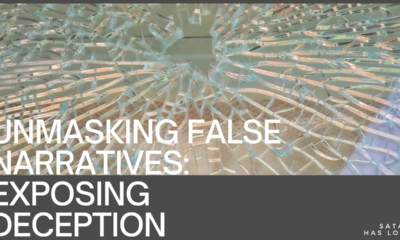
 Clergy4 days ago
Clergy4 days agoWhy Do The American People Let The Corrupt Media & Politicians Set The Propaganda Narrative – Speak On Their Behalf
-
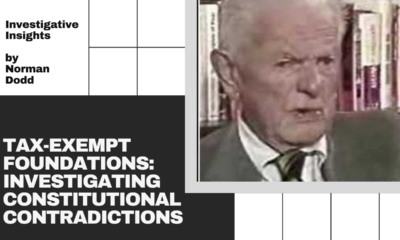
 Constitution5 days ago
Constitution5 days agoCHAPTER 9: Norman Dodd Interview Space Is No Longer the Final Frontier––Reality Is [upcoming release April 2024]
-

 Entertainment Today4 days ago
Entertainment Today4 days agoCivil War (2024) – an incomplete prediction
-
![CHAPTER 10: Objective Reality Is Required for a Free Society Space Is No Longer the Final Frontier—Reality Is [upcoming release May 2024]](https://cnav.news/wp-content/uploads/2024/04/Objective-reality-v-acceptance-400x240.png)
![CHAPTER 10: Objective Reality Is Required for a Free Society Space Is No Longer the Final Frontier—Reality Is [upcoming release May 2024]](https://cnav.news/wp-content/uploads/2024/04/Objective-reality-v-acceptance-80x80.png) Education4 days ago
Education4 days agoCHAPTER 10: Objective Reality Is Required for a Free Society Space Is No Longer the Final Frontier—Reality Is [upcoming release May 2024]
-
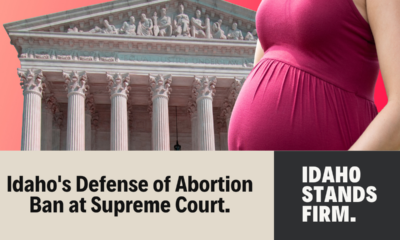
 Human Interest3 days ago
Human Interest3 days agoIdaho prepares to defend its abortion ban
-

 Civilization3 days ago
Civilization3 days agoEarth Day Should Celebrate U.S. Progress & Innovation
-
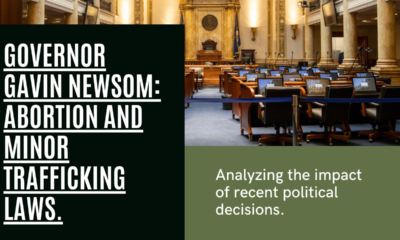
 Civilization1 day ago
Civilization1 day agoNewsom plays silly abortion politics



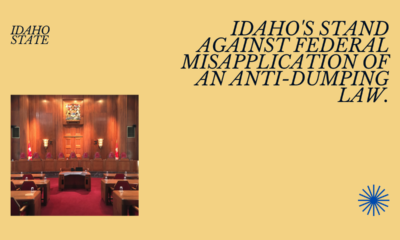





[…] missions of federal law-enforcement and intelligence agencies. He would then classify them as “Schedule F” employees – staff in “positions of confidential, policy-determining, policy-making, and […]